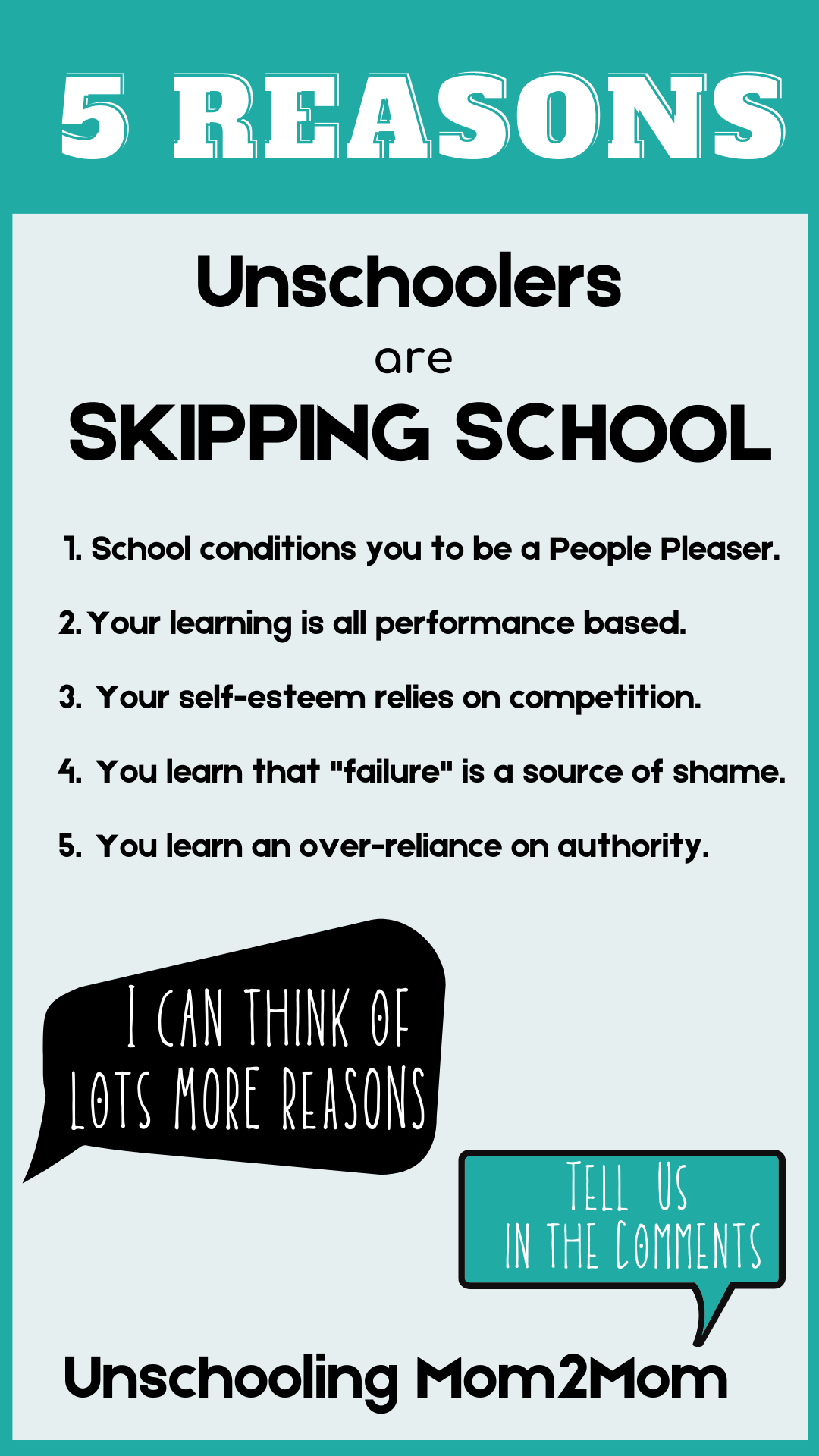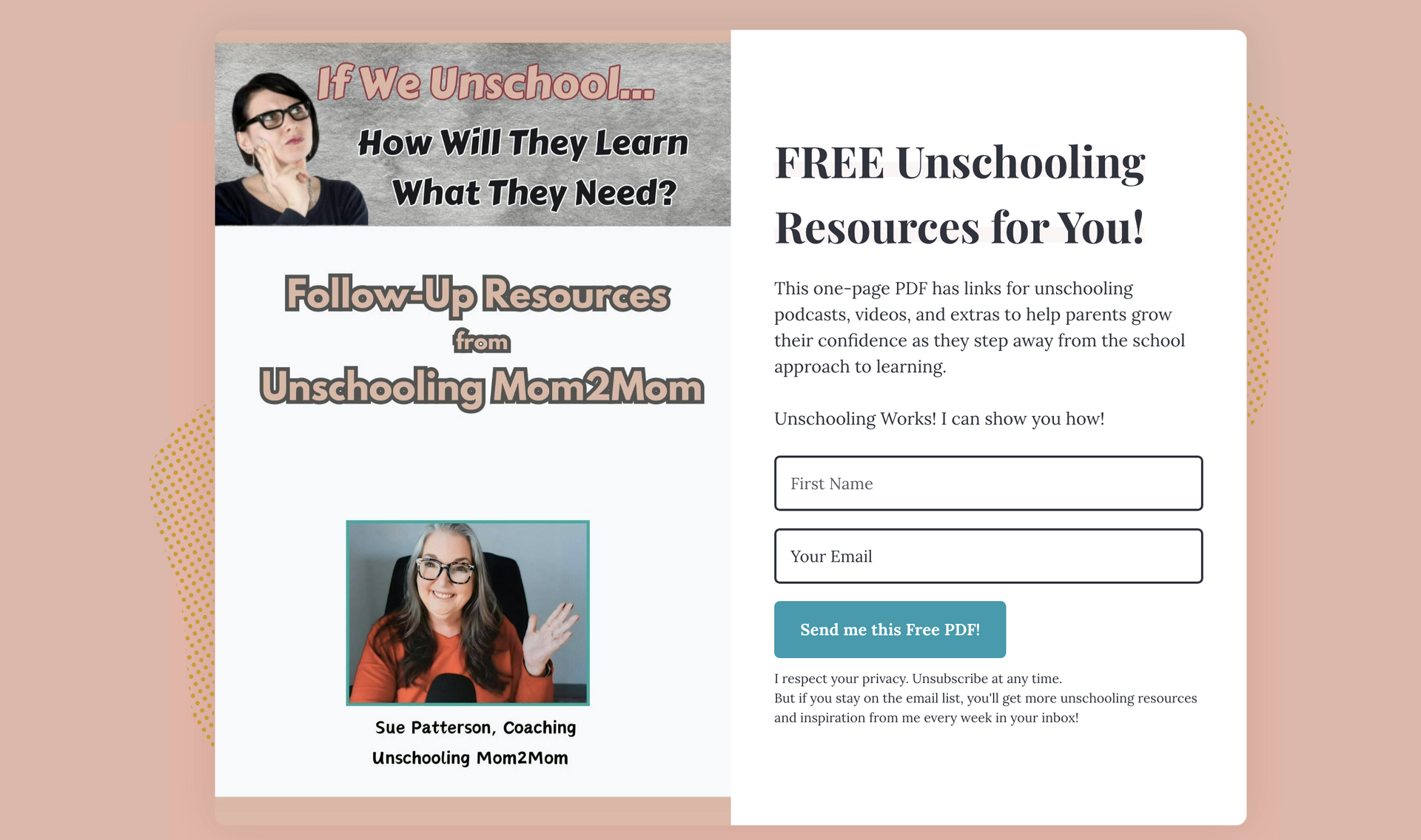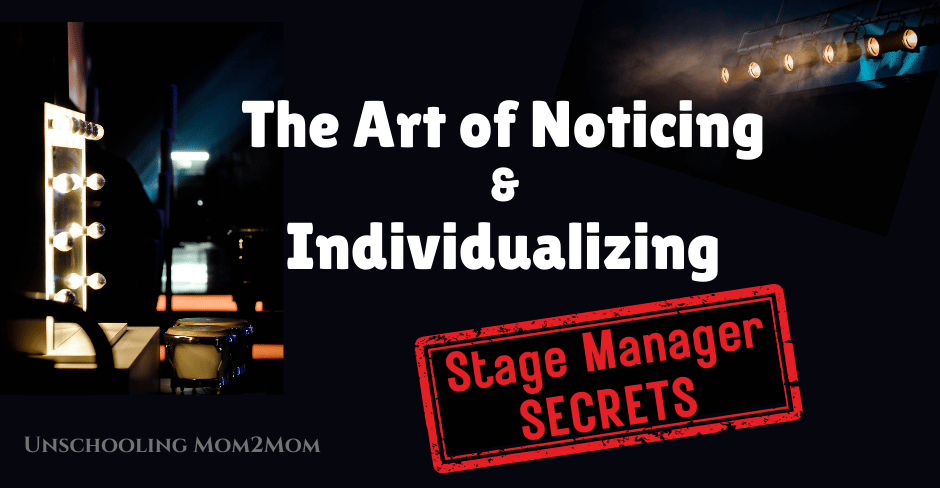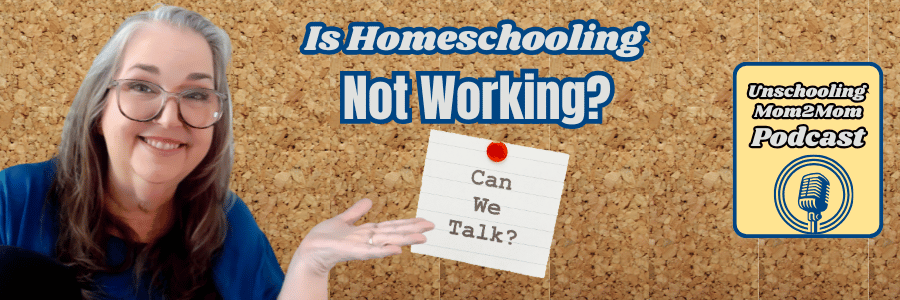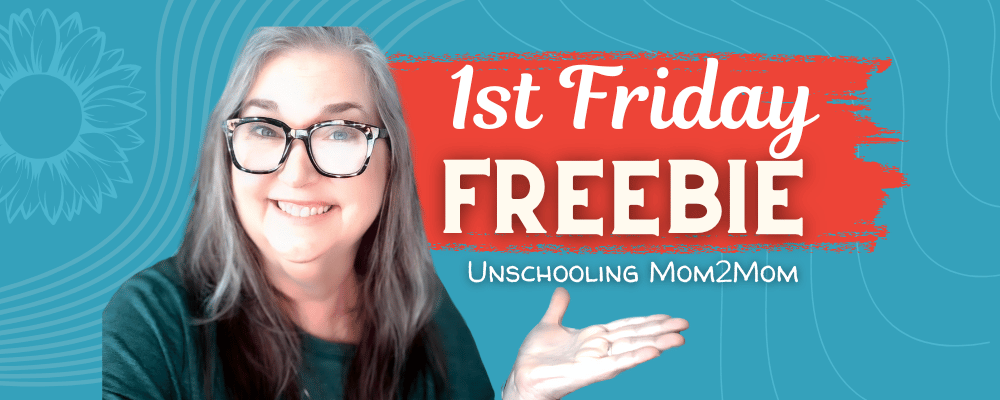How do Unschoolers Learn Subjects?
If you're looking into unschooling, it's not unusal to wonder,
"How DO unschoolers learn school subjects?"
or
"How will they learn what they need to be successful adults if you don't go out a buy all the curriculum in all the typical subjects."
The word, "successful," is going to mean different things to different people.
Maybe it's about getting into college, or finding a good career.
Maybe it's more about personal happiness - and the ability to fund that themselves.
Last week, I hosted a free webinar for about a hundred people wondering this same thing.
It's up at the
Unschooling Mom2Mom YouTube channel now - please subscribe!
We talked about the actual subjects that weave into a variety of everyday activities for kids. I have visuals and handouts - all the things to help you get more comfortable with this concept when you hop over to the description at the YouTube channel. (If you registered for the webinar, check you email inbox for the links.)
Looking Beyond the Classroom
But there are a few things I want you to know:
How We Got Here
It might help to think a little about how we got here.
(History of Education in the USA)
Back in the 1850s, Horace Mann promoted the idea that all kids of a certain age be taught certain subjects. By 1930, at least in the United States, sending kids to school became legally mandatory. We could talk for days about what prompted this and how the public was convinced this was a good idea - and in fact, some pieces of it still have merit. We DO benefit when our citizens are educated. It just all depends on what we think constitutes a good education, right?
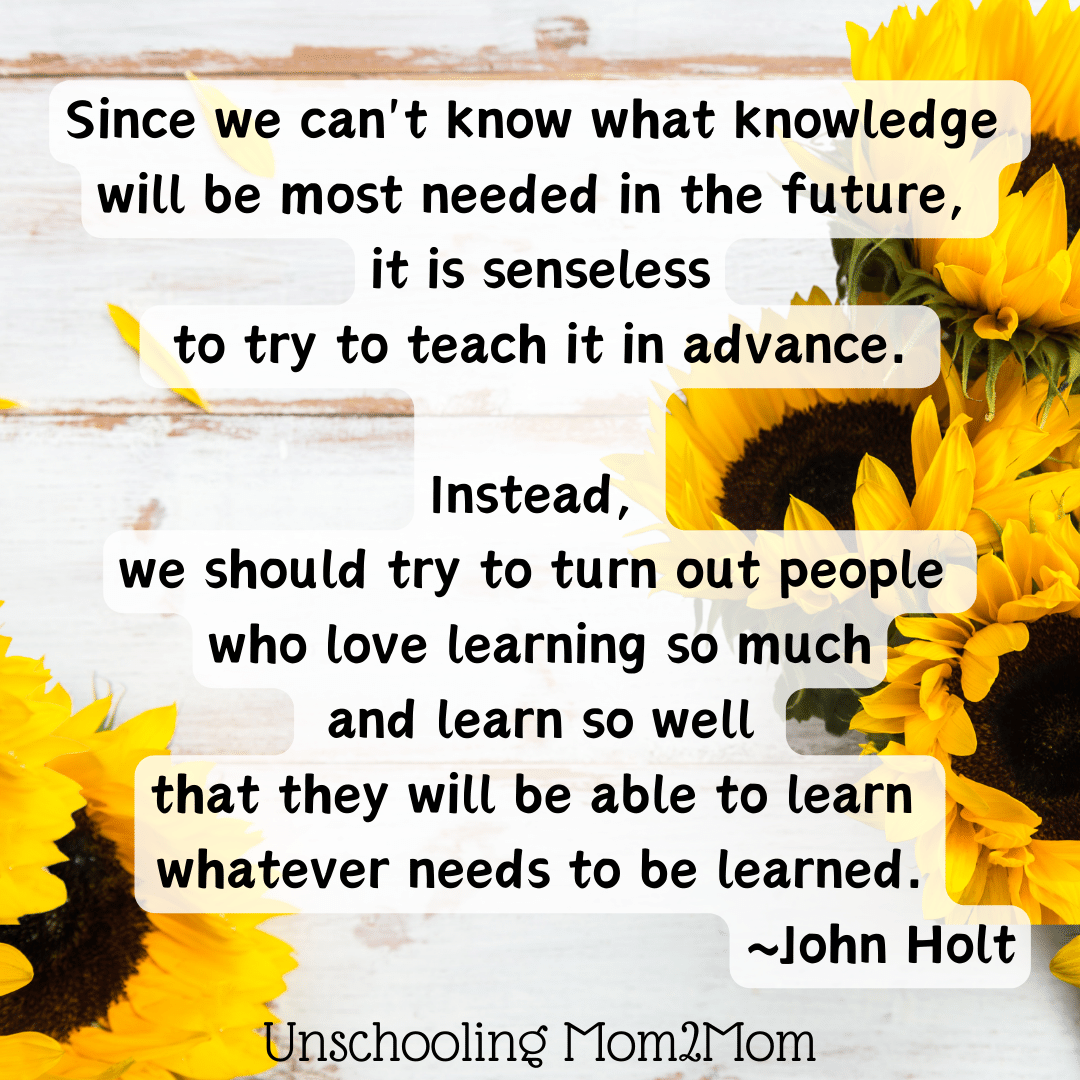
And before I go off the rails here, I'm bringing this up because not a lot has changed in the way information is delivered in a school setting. Sure, the internet has made an impact, but kids are all still grouped by age, instead of interest or capability. Multi-age classrooms are a thing of the past. The teacher is expected to deliver all the information - wanted or not - to the children. And then they're tested to see what they retain. Then it's on to the next topic. For 12 years. All of childhood, really.
Bells ring, signifying it's time to move to the next subject, each getting between 30 minutes and an hour per day. A scope and sequence weaves throughout the curriculum, all determined by the legislature and the book companies. Attempts are made to help kids who don't conform to this approach - that's where the IEP concept comes into play.
Individualizing, though, isn't really something the system is designed for, so it's limited.
But you know all this. You've been there. Most of you listening. And if you're here, you've probably noticed the short-comings.
This all-too-familiar approach to learning, this "School Approach," whether it's happening in your local neighborhood buildings or it's being implemented at home in a traditional homeschooling model, this is just one approach to learning. It resembles the factory lines because it's a product of that era. But the world has moved on. And our children deserve to move with it, instead of being tied to an antiquated system designed in the 1800's.
So if schools are derived from the Industrial Age, what does learning look like in this innovative Age of Information?
We've discovered a few things along the way:
- Learning is bigger than school
- Schools are not the only source of information when you want to know something.
- Learning styles vary and the teacher-driven lecture format isn't the best approach for a lot of people.
- Critical thinking and problem-solving skills are developed when you're encouraged to explore instead of giving One Right Answer for a test.
- Lifelong learning has become the norm, with people continuously adapting and acquiring new knowledge and skills, changing careers, shifting interests, pivoting due to changes in the world - throughout their entire lives.
What's the Better Option?
How Can They NOT Learn What They Need?
I know, answering a question with a question can be a little maddening. But it's the truth. I have even more questions for you.
When we can see that the world is changing at a rapid pace, don't we need to help our kids be able to change with it? Learning isn't about memorizing facts - those are at our fingertips all the time. It's about being able to think critically, solve problems, and adapt on the fly. These are the skills that really matter in today's fast-paced world.
Doesn't it seem logical that encouraging our kids tap into our communities, online and locally - we're opening doors to endless opportunities for them to explore their passionas and curiosities. They can connect with diverse perspectives and see the world as it truly is today - a place packed with possibilities, connections, and so many learning adventures!
Sometimes people say,
"That's all fine and good, but they need The Basics first."
I'm not sure we're even clear on what The Basics are!
Learning to read? Well, yes, that's important. But when you step away from school, you can see that your reading skills aren't necessarily what determines whether or not you learn. You can learn from watching videos, talking with other people, listening to pocasts!
Maybe adding/substracting, computational skills are what you're thinking is part of The Basics? But when kids are allowed time to play - whether they're building in the backyard or on Minecraft, cooking in the kitchen, creating clothes for their dolls or online characters - they're learning math skills. They're sorting and measuring, they're estimating and EXPERIENCING math... as well as physics and geometry and all those basic math skills people are worried about.
And before you dismiss the online playing - we are seeing kids with so much richer vocabulary from watching videos online. They're spelling skills grow as they chat or follow directions. Their research skills are way beyond our own as they're trying to solve issues they're encountering.
When a child isn't waiting for someone else to randomly pour information into them, they take up the task themselves, right? They move in the direction of their interests. And as they do, they bump into obstacles that keep them from moving forward. THESE become the catalysts to learn more, to develop new skills, to continue on their path. They don't have to be convinced to do this, or told that their future depends on it. They don't have to be coerced or bribed or shamed.
When we haven't convinced kids that their preferences are secondary or that they have to do the adult's choices before they can get to theirs, this autonomy grows.
I know you remember what it was like when you were told to wait. When you were told that you could play after you did your homework. Or you couldn't start a project because you were on a school schedule instead of your own. That little light inside you dimmed - until you got out of school. THEN you were able to explore your interests and see what your own preferences were instead of someone elses.
When we take off those rose-colored glasses, we can see that the old ways weren't always best. But helping kids deal with the reality and OPPORTUNITIES that learning presents today - that's our role as parents.
But HOW do we do this?
1) A Little Internal Work.
We look at objectively at our own experience with learning. We see where it fell short and where we excelled.
And then we look at why that happened. When we step away from what's familiar, we have to make a conscious effort to learn more about how unschooling and deschooling works. Lucky for you - you have an entire website here to work your way through! 😉
2) Prioritizing Our Kids
We protect our little learners from our own fears. We resist the urge to make comparisons and interfere in the learning process. We encourage curiosity and self-direction. We answer questions and provide opportunities, without trying to secretly mold and duplicate our own school experience. We recognize that fear and conformity is how we were raised - so it's not surprising that we fall back on that tactic when we step into uncertain times. It helps to find other unschoolers doing this so we can bounce ideas off of them and remind ourselves that we're not alone.
3) Reframe Your Ideas about Learning
We recognize that learning is happening EVERYWHERE! And everything really DOES count. Little snippets of conversations or bits of information add up to a completely individualized pile of knowledge for our kids. This helps them direct their own path - with our help, of course. But they don't have to have a mid-life crisis in order to finally have the nerve to do something they want to do. As unschooled kids, they've been moving in this direction all along. Sometimes the concern is how to document all this so they CAN get into college if they'd like to or if the career path they choose requires it. Rest assured, unschooled kids are doing this all the time! No doors have closed for them!


